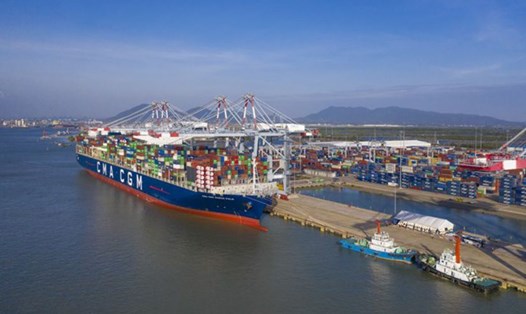Vietnam's strong green transformation
Not only becoming the first Vietnamese car company to dominate the number 1 market share, VinFast is also one of the leading units in the green and sustainable development trend, with a "strong Vietnamese" spirit.
Mr. Nguyen Viet Quang - Vice Chairman and General Director of Vingroup Corporation emphasized that for decades, our country has always been concerned with the goal of becoming a modern industrial nation. That is an industry capable of autonomous research and production, especially building a national brand of world-class high-tech industry and a voice in the international arena. From there, contributing to enhancing Vietnam's position in the region and the world, standing shoulder to shoulder with friends from all over the world.
That has also been the wish of many generations of Vietnamese people over the years, becoming the common aspiration of the entire nation. But on the other hand, that goal may have to go hand in hand with environmental challenges. The parallel between modern development and the risk of pollution is a reality that all countries are forced to face and need to find effective solutions.
In the context of air pollution becoming the biggest threat to human health and future, electric vehicles are considered by the world to be one of the most effective solutions to reduce CO2 emissions for a greener and more sustainable future. That is the reason why Vingroup is determined to accelerate the development roadmap of electric vehicles and stick to this choice, even though this is one of the most difficult, resource-intensive and fiercely competitive fields. Our desire is to build a solid foundation for a green Vietnam of the present and the future as soon as possible, while making a practical contribution to the goal of reducing greenhouse gas emissions to 0 (Net Zero) by 2050, which the Government has strongly committed to with the international community.
To realize this mission, in addition to the determination to produce electric vehicles, Vingroup has also taken drastic actions over the past time. Vingroup has established the Fund for a Green Future and announced 10 key action programs, focusing on 10 essential areas of life. For each program, Vingroup has practical actions, such as: Co-launching the campaign "Join hands to collect trash on the river" in Ho Chi Minh City, Da Nang, Khanh Hoa, Can Tho - in Can Tho alone, the campaign collected more than 10 tons of waste, worth more than 200 million VND; organizing the Green Voice contest season 1, attracting the participation of nearly 1,700 contestants from 455 schools across the country, helping to raise awareness of environmental protection for the younger generation...
In particular, the Fund for a Green Future also has strong support from VinFast, as the company committed to contributing VND1 million to the Fund for each electric car and VND50,000 for each electric motorbike sold. Partner company GSM also contributed VND1,000 from each Green taxi ride to the practical activities of the Fund for a Green Future, contributing to the implementation of Vietnam's Net Zero goal.
Companionship in green transformation
Talking about the greening strategy of the automobile industry, Dr. Le Xuan Nghia - economic expert - said that from the perspective of businesses, I see a great need for commitment and pioneering. Through monitoring in Vietnam, I see that there are few businesses that can do what Vingroup is doing. That is, looking directly at the issue of energy conversion, green conversion in transportation, helping the Government's Net Zero goal become more realistic.
Vietnam has 6.5 million cars and 74 million motorbikes, making it one of the countries with the second highest greenhouse gas emissions through road transport in Southeast Asia, after Indonesia, and the rate of increase in emissions through road transport is very fast. On average, within 10 years, it is about 15%/year, while the major trend of countries has been and is finding every way to reduce greenhouse gas emissions through the use of primary energy based on internal combustion engines.
To accelerate the green transition for electric vehicles, not only from businesses, the Government needs more support. Firstly, in some countries in the early stages of developing the automobile industry, they often maintain a large banking system with enough financial resources to finance the development of heavy industry or the Government guarantees external loans for businesses to develop this industry.
Second, the current complete opening of the automobile industry market is also a major obstacle for the domestic automobile industry. Of course, this is a requirement of globalization, however, the experience of some countries shows that the policies of the Government support without affecting the competitive environment, for example, funding through land prices, public procurement such as official vehicles must be domestic electric vehicles or encourage consumers to use domestic electric vehicles, or products of the domestic industry in general.
Third, develop a public transport system that runs on fuels that emit less greenhouse gases, especially electric vehicles like in some countries. The government subsidizes fares to encourage consumers to use this type of vehicle.
Some other policies such as special consumption tax, VAT, road tolls, infrastructure for electric charging stations to ensure that businesses can develop charging stations in many places with convenient locations and low costs to support electric car businesses to minimize the costs of charging stations, maintenance, battery repair, etc.











